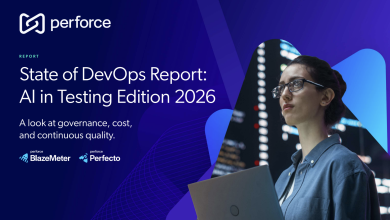
Artificial Intelligence (AI) may have started as a big business solution, but AI tools and services are now well within the grasp of SMBs. Firmly ingrained in the fabric of business conversations, AI momentum – and some hype – presents a great opportunity for transformation, especially for small but mighty businesses.
At the start of 2023, there were 5.6 million small businesses operating in the UK, each of which contributed a significant amount of GDP to the UK economy. So, if these businesses are the bedrock of the economy, how can technology support and propel their further growth?
AI stands out as a game-changer for small businesses, solopreneurs, and digital agencies. From automating routine tasks and enhancing customer interactions to providing deep insights through data analysis, AI empowers small-scale operators to compete on a larger stage, streamline processes, and drive innovation. This democratisation of AI technology can lead to unprecedented growth, efficiency, and creativity, enabling even the smallest ventures to harness its potential and thrive in the competitive digital landscape.
Tapping into the AI advantage
By 2025, the AI space is forecast to reach $126 billion in annual revenue. The conversation is no longer about how we define AI but how we scope, deploy and scale to realise business value and benefits. To win, these companies must navigate the complex landscape of rapid technology advances and application.
Before considering the implementation of AI, it’s essential to first understand your business needs. Developing an AI implementation framework provides a structured approach to ensure you see tangible benefits from AI. The application of AI can vary based on the size and type of business, yet it consistently offers support across various domains – from back-office administration to strategy, planning and enhancing team, culture and personal effectiveness. Having the needs in the back of your mind will help decide the right way to implement AI.
Solopreneurs
Being a solopreneur means wearing many hats, from managing daily operations and marketing to customer service and strategic planning — all on your own. This journey, while rewarding, is often fraught with challenges due to limited resources and time.
However, the advent of AI offers a lifeline, providing powerful tools that can transform solopreneurs’ operations. Research suggests that AI can boost a solopreneur’s productivity by 40%.
Solopreneurs have a wealth of tools at their disposal to start their own ventures. The increased availability of online tools and platforms has made launching a business faster and more accessible than ever. AI technology offers new capabilities that can enhance a leader’s toolkit, from improving decision-making to personalisation at scale.
With vast amounts of data generated today, AI can empower solopreneurs with actionable insights. Machine Learning (ML) algorithms enable quick analysis of this data, identifying trends and providing insights into consumer behaviour. This allows Solopreneurs to stay agile and responsive to market demands giving them a competitive edge.
AI can also be used to deliver personalised experiences at scale. AI algorithms can analyse customer data to make personalised recommendations on products and services. Personalised experiences foster loyalty and drive repeat business, which is essential for this type of business structure.
Digital agencies
For digital agencies, Generative AI offers significant potential to drive huge gains in worker productivity and efficiency. This technology isn’t about replacing staff but enhancing the contributions of each team member.
We’ve seen AI play a fundamental role in content generation for digital agencies. This integration is particularly effective when you think about how you can apply AI across the different stages of article production.
For example, when starting a new piece of content, it can help with gathering the necessary research materials, producing an outline, suggesting the right formatting or producing a rough first draft.
Generative AI can also provide examples of tone-of-voice. It can help to articulate a spokesperson tone of voice and even product content that mimics it moving forward, which supports the style curation of future content.
Keep in mind that human creativity is still of fundamental importance. The synergy between human ingenuity and AI-generated content can be a game changer for agencies. However, it’s important to note that no single AI tool suits every need. Agencies should experiment with various tools, discarding those that fall short while optimising those that work to ensure the highest quality output.
Small – medium-sized businesses
With advancements in both technology and personnel, SMBs are often the most eager to adopt AI to maintain competitiveness. However, the drive to keep pace with competitors should not be the only motivation for leveraging AI.
There’s a huge opportunity for AI to enhance customer support functions, an important area for SMBs where exceptional service can be a competitive differentiator. We will witness substantial adoption of AI in customer service, including the integration of chatbots and conversational AI call agents that enhance user experiences while optimising resource allocation.
AI solutions have the potential to drive substantial cost savings by efficiently handling routine tasks, freeing up employees to tackle more complex issues. This shift not only boosts efficiency but also fosters business growth by allowing employees to focus on strategic activities that add greater value.
What constitutes effective AI implementation?
Effective AI implementation goes beyond merely adopting advanced technologies; it requires strategic planning, adequate resources, and a supportive regulatory environment. Government funding and involvement in the regulation development plays a crucial role in empowering businesses to access and integrate AI solutions.
Government funding
Financial support from the government can alleviate the high upfront costs associated with AI implementation. Grants, subsidies, and low-interest loans make AI solutions more accessible, enabling SMEs to compete with larger corporations that have more resources.
Additionally, government-funded training programs can upskill employees, ensuring that businesses can effectively leverage AI tools. This financial backing not only accelerates technological adoption but also fosters innovation and economic growth, creating a more dynamic and competitive business environment.
Involve them in regulation
Enterprises already sit at the table and dominate the AI conversation.
The Labour government recognised the speed of AI technology development, alongside safeguarding responsibilities.
Labour will ensure the safe development and use of AI models by introducing binding regulations on the handful of companies developing the most powerful AI models. However, if the only companies contributing to regulation conversations are enterprises, this technology will only stand to benefit them.
Solopreneurs, digital agencies, and SMBs need to be seen and heard within these conversations to ensure regulation doesn’t stifle their innovation, but also an opportunity to adopt AI for transformation.
The time is now
If these companies are left behind in the AI conversation, they risk significant competitive disadvantage and potential obsolescence. As larger enterprises and tech-savvy competitors leverage AI to optimise their operations, improve customer experiences, and drive innovation, those without AI capabilities may struggle to keep up.
Failing to integrate AI into their business models could lead to diminished market relevance, reduced profitability, and a steeper climb to stay viable in an increasingly automated and technologically advanced business landscape. The time is now to engage with AI.



